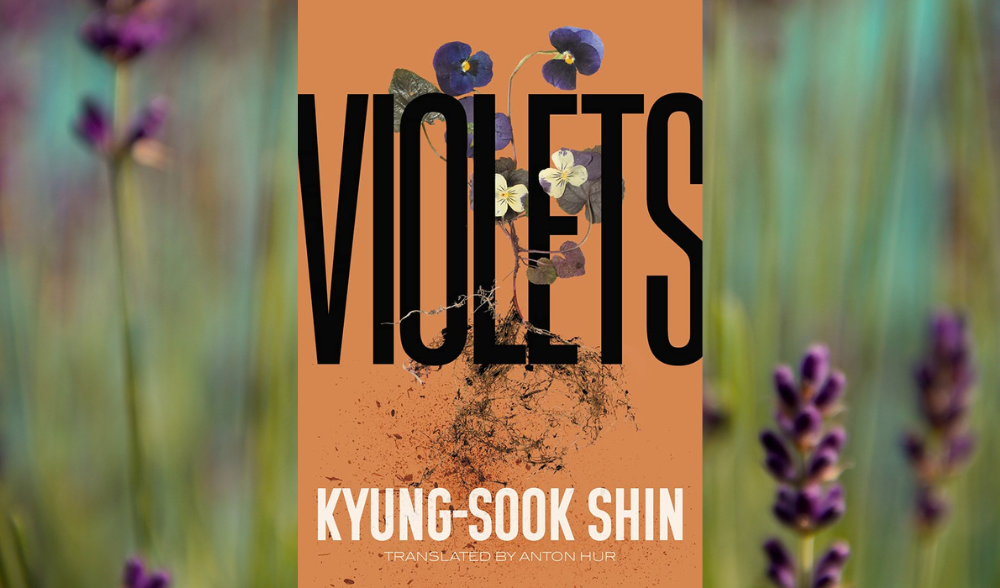Violets – The Feminist Press at CUNY – 222 pages — $22.03
BOOK REVIEW EDITOR-IN-CHIEF ELLA KELLEHER WRITES – “Violets, Violin, Violence, Violator,” chants the main character, San, as she reads from a dictionary. In just a few short lines, a beautiful purple flower morphs into “one who breaks rules, invades, insults, rapes.” South Korean author, Kyung-Sook Shin, known for her acclaimed novel The Court Dancer (2018), and experienced translator Anton Hur (Cursed Bunny, 2021), together weave darkness, beauty, and violence into the complex narrative within Violets (2022).

On a humid, sticky day in May, a close friendship ends suddenly. After playing in the fields, two young girls named San and Namae swim fully clothed in a nearby river. They decide to dry themselves fully naked. Stretched out side by side, the two embrace and kiss. San decides, “I will love you more than myself.” She strokes a birthmark on Namae’s back. Namae, full of regret and shame, runs away without another glance and refuses to ever speak to San again.
Namae’s rejection of her catapults San into a world of loneliness. The first spark of joy comes from a job opening at a local flower shop in Seoul. She’s in her twenties in the big city with all the opportunities she never had, but she decides to be a caretaker to exotic and native flora. San sees herself in the delicate flowers she attends to: “Whenever she wipes the window or sprinkles the plants exposed out on the street, it’s her own fragile inner self that she’s watering.” Perhaps she imagines herself as the loving parent she never had, caring for delicate flowers she has superimposed her younger self onto.
Working alongside San is the charismatic, spunky Su-ae. While their relationship has depth, San keeps Su-ae at a distance. A psychological safety net designed by her childhood self in response to the profound trauma caused by Namae, Su-ae senses this invisible divide and tries to reach across it and fails. San’s downfall begins when she indulges in her fascination with a womanizing photographer who ventures one day into the flower shops to take pictures of the merchandise. He throws at her a single, throwaway compliment. A passing moment of flirtation spins into a dark obsession.
San views the man as a being split in two: while his demon self tries to attract her attention and lure her to self-destruction, his true self remains unassuming and uncaring toward her. San’s attraction is not one born from this moment of exchanged glances. Instead, it “has lain in wait for millennia before bursting forth all at once.” Author Kyung-sook Shin establishes that San’s experience of loneliness, lust, distrust, and myriad other confusing emotions is a decidedly female outcry that “for centuries was never given an ear.” San’s story aims to reflect the thousands of similar stories untold by the women before her.
Serene beauty in the novel comes from brief moments when San is truly happy. A day where San spends working on a farm for the flower shop owner lends her the satisfaction of a hard day’s work, tightening her bond with her companions and coworkers. Sharing a meal, saluting some drinks under the beating heat of the sun. However, Shin’s slow-paced, dreamy writing style leaves the constant impression that San’s joy will always be fleeting. San, a metaphor for all the forgotten and ostracized women in society, represents the fickle contentment so many women experience. The letters San receives from her estranged mother, a reminder of her abandonment, and a brewing unhealthy obsession with the photographer’s objectification of her infect San’s mind with darkness.
Every scene in Shin’s story is saturated with a raw, sometimes indescribable feeling. Depicted is a tapestry of events bursting with misogyny, dramatizing the desires and aspirations of a doomed protagonist who craves connection and independence in her own way. Shin’s afterword completes her novel. She writes that “Violets are very small plants. So small they’re easily overlooked as weeds.” The time that Shin devotes to telling San’s story and outlining the unfriendly, confusing world she lives in reveals that even the most vulnerable and seemingly trivial stories are worthy of respect and understanding. Even something small and helpless like a violet is beautiful and deserves to be cherished.

LMU English major graduate Ella Kelleher is the book review editor-in-chief and a contributing staff writer for Asia Media International. She majored in English with a concentration in multi-ethnic literature.


One Reply to “BOOK REVIEW: VIOLETS (2022) BY KYUNG-SOOK SHIN – A LONE SOUL IN SEOUL.”